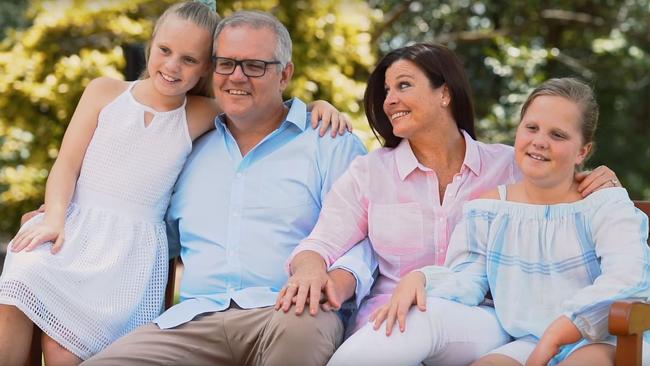
The Coalition launch saw a solitary Scott Morrison on stage to introduce his family and his virtues to the people and draw the nexus between his family story and the Australian story.
The brand Morrison seeks was writ large: the economy is people and people are the economy.
He offers himself as the leader for the ordinary Australians who lack influence and power.
Morrison’s message harks back to the Liberal Party originating impulse, the virtuous middle class who live by work, education, family and sacrifice.
There are two Liberal Parties in this election — the Shorten fictitious Liberal Party obsessed about “the big end of town” and the actual Morrison party with the leader’s credo: “Life’s about what you contribute, not what you accumulate.”
The modesty of the Morrison campaign means it is highly targeted — don’t let Labor’s reckless spending begin; don’t let Labor experiment in a high-tax regime with your money; stick with a new, different, down-to-earth Liberal PM you can trust. Morrison projects as a benign uncle but crafty enough to understand money.
The Coalition’s launch was in contrast to Labor’s big, bold, celebrity event with female political stars, cheering legions of enthusiasts and sanctification of Bill Shorten. Morrison's launch was family folksy, almost corny, an extended Mother’s Day love-in, an introduction of Scott by himself to the people.
He invoked “the promise of Australia” — the promise that allows people to quietly enjoy their lives, realise their aspirations and be accepted for who you are — regardless of age, ethnicity, religion, gender, sexuality or disability. He is pitching under the radar, outside the political bubble. “It is my vision for this country as your Prime Minister to keep the promise of Australia,” he said.
It is a more noble capturing of his election theme — this is not the time for a dramatic change of direction. Here is the cultural conflict at the election’s heart — Shorten offers radical changes across the board while Morrison says a prudent nation must “stay the course” because, under new leadership, there is no need for sweeping departures.
Morrison’s launch was a major break with the ethos of either Tony Abbott or Malcolm Turnbull. He poses as neither a muscular conservative nor as a business-savvy progressive. He projects as your next-door neighbour who happens to be PM and is available for catching the footie or advice on your household finances.
Morrison said: “Countries with weak economies do not have good public hospitals, a reliable pension, affordable medicines, Medicare, Headspace, an NDIS and increasing investment in public schools and aged care. The economy is what people live in. It’s real.”
His economic troika is better services, no new taxes and the budget surplus. Morrison said Medicare had never been as strong, with bulk-billing at nearly 90 per cent and hospital funding increased by 60 per cent under the Coalition. Increased funding to public schools was similarly running at 60 per cent. He pledged to tackle youth suicide, expand the NDIS and mental health initiatives.
His quest to create a synthesis between good economics and good social policy is the heart of his strategy to rehabilitate the Liberals with an effective philosophy. His entire campaign is an attack on the wedge politics Labor has employed — that the Liberals are the party of business, banks, the rich, powerful and uncaring.
Everything Morrison says and does is designed to dismantle this perception. The question is: does he have enough time? The related question is probably the biggest of the campaign: is Shorten the frontrunner because the public actually want his agenda or because past Liberal chaos means the party has forfeited the right to govern?
He mocked Shorten, saying his reckless spending was a burden for Australia, not a vision. He warned Labor’s spending was so big the one certainty was it would end in administrative chaos.
Morrison was joined on stage by his wife, Jenny, and his mother, Marion as well as his two daughters. His father was too frail to attend. Morrison said his parents had been married for 56 years. “They saved,” he said. “The planned. They sacrificed.”
His mother ran the Girls Brigade at the church every Thursday and Friday school night for 45 years. Morrison and his brother Alan grew up sharing a bedroom.
Invoking these virtues, Morrison said: “It’s about serving others, because in life, it’s people that matter.” Drawing the link between his life and the lives of many Australians, Morrison captured the narrative: “Get an education, get a job, start a business, take responsibility for yourself, work hard.”
He is running on policy and virtues. It is a belated effort to provide the Coalition with the moral foundation it has been lacking. He was introduced by the party’s favourite Victorian son, Josh Frydenberg, who said: “The Labor Party knows only one answer to every question — and that is higher taxes.”
The launch had targeted initiatives highlighting the government’s vulnerabilities: more infrastructure for Melbourne and a scheme to boost first-home ownership. Morrison’s central pledge is known — the creation of a million and a quarter jobs, better services and better surpluses without new taxes. Ultimately, it comes down to trust.




This was Scott Morrison’s no-frills pitch to the ordinary people — “the simple, decent, honest Australians” — the Forgotten People whose hopes and aspirations are held hostage to Labor’s grandiose big-tax, big-spend agenda.